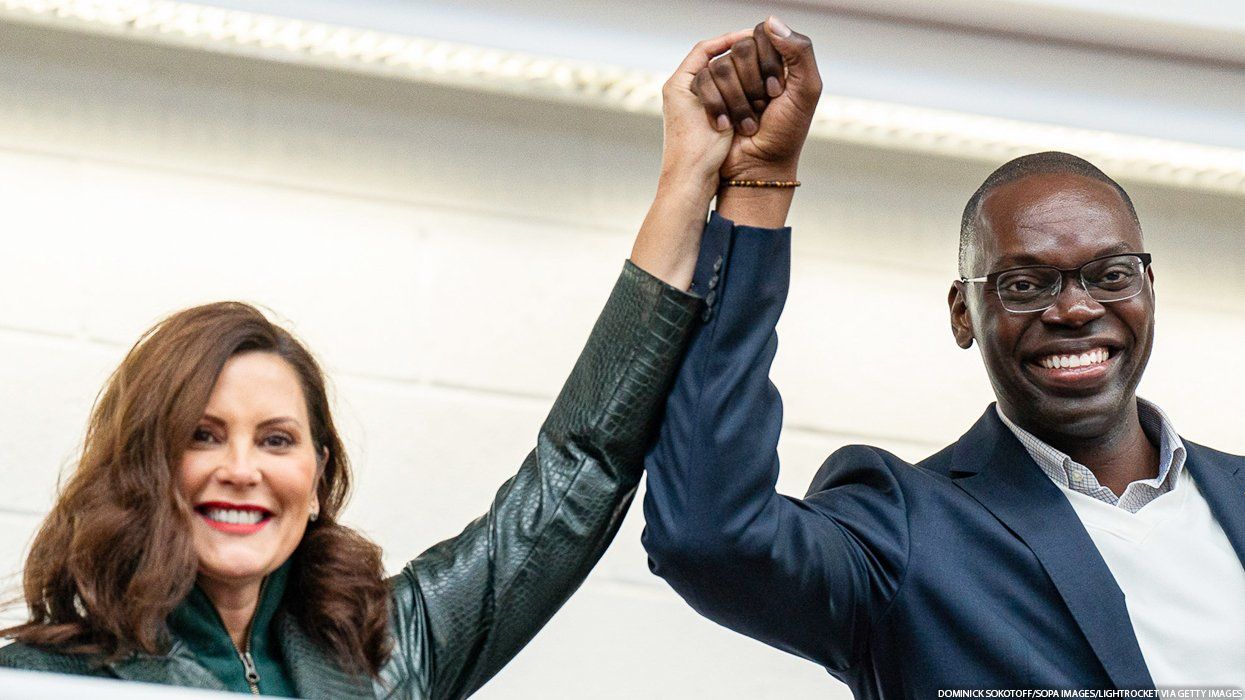The message from Gov. Gretchen Whitmer and Lt. Gov. Garlin Gilchrist II to the LGBTQ+ community is clear: You will always have a place in Michigan.
As a growing number of states across the country pass legislation restricting the rights of queer people – particularly transgender individuals – Michigan has set itself apart by instead enacting protections for the LGBTQ+ community, something the state’s leaders say they take great pride in.
Since 1977, Michigan’s Elliott-Larsen Civil Rights Act has guaranteed equal protections in employment, housing, and education for those regardless of race, religion, or sex. In 2023, when Democrats gained control of both the state House of Representatives and state Senate, Gov. Whitmer, a Democrat, was able to amend the act to include gender identity and sexual orientation, making the state one of few to explicitly outlaw discrimination against LGBTQ+ people.
“This is a subject that we have been trying to get addressed for decades in Michigan, and with my reelection in November, and Democrats flipping both the House and Senate, we knew we could finally get it done,” Whitmer tells The Advocate Channel.
As the first Michigan governor to fly a pride flag at the state capital, Whitmer says she has “been a long-time ally of the LGBTQ+ community.” She notes that “beyond it being the right thing to do,” the subject has also become “very personal” to her in recent years.
“I’m also now ... a proud mom of a gay woman,” Whitmer continues. “Of all the great things we’ve been able to get accomplished, [the civil rights act] is one of the things I’m really most proud of. Because getting Michigan on the right side of history is important.”
Gilchrist also regards the policy as “the right thing to do,” particularly at a time when conservative states are rolling back LGBTQ+ protections. Beyond achieving equality from a policy standpoint, he says that it “sends a message that this administration [cares] about people being safe.”
“I think it creates a stark contrast between the state of Michigan and other parts of the country where you have legislatures and executive offices that are actively working to legislate people out of protections in their states, and creating danger – real danger,” he says.
According to the Democratic lieutenant governor, the protections are now “particularly important given the alt-right assault on people who are transgender.” He asserts that “we’re not going to be apologetic” for protecting LGBTQ+ Michiganders.
While Gilchrist refers to the recent crackdowns on civil rights as “disgusting,” Whitmer particularly takes issue with the “craven politicians” pushing discriminatory laws.
“There are so many craven politicians who like to pick political fights or demonize parts of our population to score political points,” she says. “And I just can’t stomach it.”
In nearly 20 states, transgender youth are at risk of losing vital healthcare. Minnesota and California recently became “safe haven” states, preventing states where gender-affirming care is banned from prosecuting those who travel to their states for treatment. Whitmer says that while the Michigan legislature is not currently considering a similar measure, it is one she would support.
“We are exploring every possibility to protect the LGBTQ+ community in Michigan,” she says, adding, “We just can’t afford to let Michigan go backwards.”
Many states have also limited discussions of gender identity and sexual orientation in public schools, manifesting primarily through bans on books with LGBTQ+ or racial themes. Illinois recently became the first state to prohibit book bans, preventing schools and libraries that remove books from receiving funds state funds. This is another measure Whitmer says she would support if it reaches her desk.
“The overwhelming majority of people oppose efforts to take books out of the library, take them out of our schools,” she says, noting, “I do not support efforts to take books out of libraries. I do think that parents should have access to information about what’s available and being taught – and that already is the case.”
Another recent measure in Michigan has prevented state funds from being diverted to conversion therapy practices. Gilchrist adds that the legislature is currently considering policies that would ban the “draconian practice” in the state altogether.
“There’s been legislation introduced this session on banning so-called ‘conversion therapy,’” he explains. “We took executive action to prevent state resources from being spent on that draconian practice, and legislation would take that much farther in a much more robust way.”
Whitmer promises to veto any anti-transgender legislation that reaches her desk, though this is unlikely, as she says that “we do have a legislature that supports the LGBTQ+ community.”
As the “alt-right assault” continues, both Whitmer and Gilchrist agree that marginalized communities must stand together, with the lieutenant governor noting: “To support each other, we have to work together.”
At the height of the pandemic, Gilchrist helmed the Michigan Coronavirus Taskforce on Racial Disparities – the “only body of its kind in the country ... that sought to have a full-throated response to the racial disparities of COVID-19 mortality.” He says that because of this work, Michigan became “the only state that actually closed that disparity gap.” This was in part due to the perspective of LGBTQ+ people of color, which Gilchrist sought to include on the taskforce.
“It was important to me to make sure that the voice of LGBTQ+ Michiganders – and particularly LGBTQ+ Michiganders of color – were represented at that table,” he says. “That made the work better, and it made our work more successful.”
He continues: “In order to make sure that we are working together, and rejecting the hatred that underlies the racism and the homophobia and transphobia that we see, we have to bind together and realize that our common goal is safety and progress. And the common thing we’re fighting against is that kind of hatred.”
To Whitmer, who is also a large proponent of abortion rights and racial equity, it has been “encouraging” to see how “young people, people of color, women, and the LGBTQ+ community have been fighting for one another’s rights.” She believes that this was showcased in the last election, when all groups turned out in record numbers to vote in support of each other.
“I think members of each of these groups understand that if someone’s attacking another’s rights and freedoms ... that they also could be next,” Whitmer says, noting, “I do think that those who think that they can zero in on, and try to marginalize any part of this bigger collective, have made a real miscalculation.”
- Under Ron DeSantis, Our Site Couldn't Exist ›
- LGBTQ+ Book Bans: Pen America Director Jonathan Friedman Shares How We Can Fight Back ›
- Marianne Williamson Shares Why She's Running For President ›
- Pedestrian Deaths Are at an All-Time High ›
- Marianne Williamson Would Protect LGBTQ+ and Workers Rights If Elected ›
- Michigan Bans Conversion Therapy for Minors ›
- 2023 Saw a 'Severe Spike' in Arrests of LGBTQ+ People: Report ›
- Culture Wars Are Dragging LGBTQ+ Support Down ›



















































